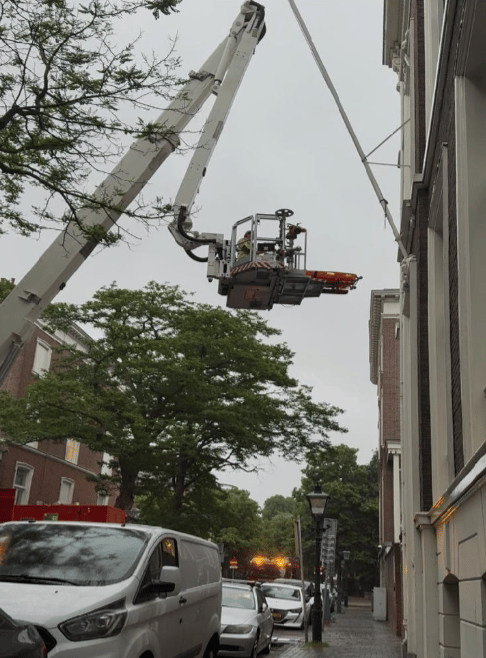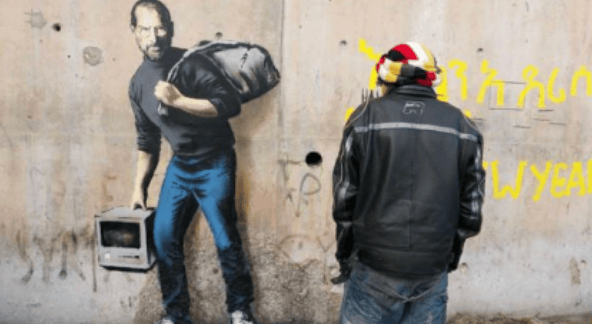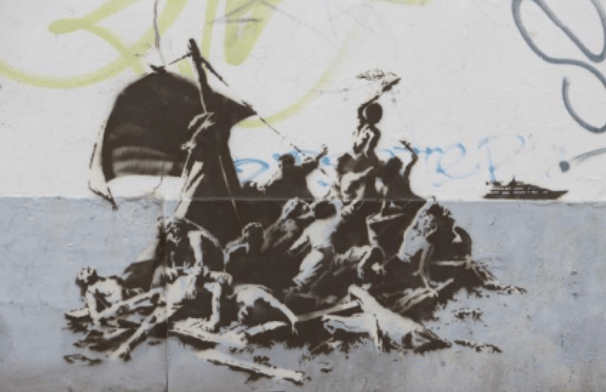- The Dodo Club Newsletter
- Posts
- The Dodo Club (47th Edition) -Refugees, Asylum-seekers and Immigration (and Art)
The Dodo Club (47th Edition) -Refugees, Asylum-seekers and Immigration (and Art)
5 Considerations for wrestling with these issues
A note from me
We are currently in mid-July and usually we would have relocated from The Hague to our modest vacation home in France by now, but not this year. Our plans for summer are up in the air at the moment because we need to sort out good arrangements for my mother, as mentioned in the previous newsletter. We have cared for my mum at our home in The Hague for 13 years and she would normally accompany us to France as well. However, her recent fall led her to being first in hospital, then in a rehabilitation centre, and now we have to arrange good longer- term residential care for her as she needs more professional care and equipment than she can get at home.
We have been visiting a few possible homes already and this process will continue until we feel we have found a place that best fits her nature and needs. This is a difficult time for the family but people are kind and the various “systems” in The Netherlands have been working well so far. Right from the beginning and her fall, a team of paramedics arrived here within a quarter hour of us calling. They quickly decided it would be best to evacuate her horizontally via a second-storey window rather than taking the stretcher down the steep stairs, and within minutes we had two fire engines here and my mum was spectacularly lifted through the air and down to the ambulance!!!

I guess it is fair to say that she was up in the air even more than our summer plans were! More importantly, she has fully recovered from the fall and she remains mentally sharp as a pin, but we need to take the steps towards more professional longer-term care. Fortunately, my mum is well-loved and we have a large rota of people already visiting her daily in the current rehabilitation centre. Thank goodness for good friends and good systems! I have written about common good in 5 previous Newsletters, but here we are seeing that concept put into practice.
This Newsletter continues to build on threads we have explored previously aimed at helping you build a better life for yourself and the people around you despite the current socio-political disruptions across the world. I hope you continue to find these Newsletters valuable and that they help you enrich your own personal or organisational perspectives.
My Bi-Weekly Guide
Refugees, Asylum-seekers and Immigration (and Art)
The July 12th cover story from the excellent weekly magazine, The Economist, considers the matter of asylum-seeking and immigration, which has recently risen to prominence as a major political issue, at least in the wealthier regions of the world. It has become woven into the deep social divisions we witness in, for example, the United States (think of the Trump administration) and the United Kingdom (think of Brexit). An increasing number of political actors across the world build their support by stoking and exploiting social fears of this phenomenon. Other social activists are outraged, however, by the perceived inhumanity and injustice in the treatment of asylum-seekers.
One such activist is the celebrated and pseudonymous street artist, Banksy. Some of his works direct heavy criticism at countries that close their borders to the refugee crisis. For example, he has painted several powerful works in the town of Calais in France where large camps of people from various war zones seeking to enter the UK have developed. In the following work he highlights the common good that can arise from migration by reminding us that Steve Jobs was the son of a Syrian migrant. The company he founded went on to pay over $7 billion a year in taxes that benefit the broader population, and it only exists because a young man from Homs was allowed into the US.

Also in Calais is his version of Théodore Géricault's famous “The Raft of the Medusa”, which was itself a painting of protest from the early 19 th century. In this work, which the artist presented on his website under the title of "We are not all on the same ship", a raft full of immigrants is trying to attract the attention of a distant passenger ship.

The headline in The Economist prompted an associate of mine to ask my opinion of this controversial issue. I realised that I had no pat responses or had thought deeply enough about the issues of immigration and asylum to pose coherent ideas. However, in the spirit of exploration, I share a couple of considerations.
Obviously, there are both moral and practical matters at play here.
As you will be aware from previous Newsletters, I am personally dedicated to supporting the “common good” (e.g. see Newsletter 37) – but this does a raise a question about who gets included in the commons.
My instinct is universalist – to embrace all people – but I am also aware of the strong critique of folks I know and respect, like philosopher John Gray, who point out that the lessons of history, and human nature, run counter to this being a realistic position. It is a position that people like me have drifted towards, folks who have become comfortable and privileged and hence separated from many daily struggles faced by others in society. In reality, most people are more tribal than universal – we assert boundaries of different kinds that separate “insiders” from “outsiders”, and we largely trust the former while distrusting the latter.
Of course, boundaries can shift and efforts can be made to find grounds that convince people to re-draw the boundaries in their minds, but it is necessary to respect and reflect on this aspect of human nature in developing policies e.g. the rules for governing how specific societies engage with issues like immigration and asylum. That is, how societies respond to people who seek to join the “commons” of another society.
In thinking about asylum, what moral guidance can we get? My famous namesake and the father of Utilitarianism may have argued for maximising the happiness and wellbeing of the greatest number of people, but I am drawn more to the notion of minimising suffering. All of us, to some extent, feel empathy towards others who are clearly suffering, particularly if we are directly confronted with them and we also conclude it is not their fault. We are outraged by unjust suffering, so that can be a starting guide.
Of course, we need to think carefully about what we mean by “unjust” and “suffering” as well. Physical suffering is more straightforward to consider than financial suffering. Considering those fleeing financial suffering forces you to consider the broader issue of immigration and the overlap with asylum-seeking that the article focuses on. Let’s ponder that for a moment.
“Insiders” within a boundary are twice as fearful of changes that could bring loss than they are supportive of changes that can bring gain (a finding of behavioural economists). So, the notion of jobs being taken or welfare systems overwhelmed has, on the surface, more powerful influence than the argument, for example, that immigrants bring much-needed labour, economic activity and service-raising potential to a society. It’s an easier job for politicians of a certain nature to exploit the fears than for others to highlight the potential gains. This is why this issue has become as divisive and toxic as it is now.
At a deeper level, however, lies the notion of who we consider “insiders” and who we consider “outsiders” – remember Brexit! This deep-lying notion shapes our attitudes to immigration rather more than the economic arguments used to legitimise our views. We have to reflect on this in policy-making – how much do we simply reflect current majority views and how much attention do we give to the time-consuming effort of shifting boundaries if we believe that is the right thing to do?
So, one of my initial conclusions is that we now need to treat policy-making for asylum-seeking and immigration separately, respecting the different (though sometimes linked) human and social drivers of attitudes toward them. Up until now, policies have evolved haphazardly in tandem and been generally event-driven.
5 Considerations for wrestling with asylum and immigration issues:
I agree with The Economist that both the underlying logic of human nature and the current level of public dissatisfaction with asylum and immigration issues support the view that policy reforms are needed. The controversies won’t disappear by themselves, and the areas have become so intertwined under current approaches that we’ve become lost in grey areas.
The asylum approach would probably be best built on the notion of “avoiding unjust suffering” with a fairly clear, but flexible, definition of suffering that most folks can support.
Separately, the immigration approach requires deep reflection on issues of “insiders” vs “outsiders” in our current societies (which may be very different in nature in different societies, e.g. U.S. vs Norway).
If we don’t agree with the status quo attitudes to this, we need to give careful thought to how much attention we can invest in shifting the insider/outsider boundaries in the minds of people in our societies, recognising that others may already be actively doing this in directions we do not find constructive.
We also need to carefully assess how to socialise new immigrants into our societies. How can distrusted “outsiders” become trusted “insiders”? Currently, different approaches have evolved haphazardly in different places. In France, for example, state institutions are designed to pressure everyone to become fully “French” while in the UK, the maintenance of separate ethnic traditions, often in enclaves, remains the norm. In Singapore, specific housing, planning, language and national service policies have been designed to forge a new Singaporean identity that has displaced traditional regional ethnic/political histories.
An opportunity for you to learn more:
If you would like to learn more about the kinds of topics covered in these Newsletters, then please consider signing up to the introductory Dodo Club Online Course.
This covers scenario/systems thinking for grappling with uncertainty, an introduction to energy transitions, and the development of strategic character in leadership.
In the interest of avoiding the fate of that unfortunate bird, the Dodo, this course aims to help us secure our own personal legacies within a changing world and the energy transition - and to leave a healthier planet for future generations.
You can access the course through Udemy using the link below!
A series of follow-up courses that treat the main topics in increasing depth and detail will be provided if there is sufficient interest.
Question of The Fortnight
Every fortnight I’ll be asking a thought-provoking question in hopes of sparking interesting and enlightening discussion.
I’d love to hear your response! You can do so by simply responding to this email.
Today’s question is:
How prominent a sociopolitical issue has immigration and asylum become in your community or society, and how useful do you find the considerations suggested above?
The Dodo Club Online Course
The Dodo Club is Waiting!
The Dodo Club is my online course which has been built for collaboration, learning and mutual support.
In the interest of avoiding the fate of that unfortunate bird, the Dodo, this course aims to help us secure our own personal legacies within scenario planning and the energy transition - and to leave a healthier planet for future generations.
You can access the course through Udemy using the link below!
You can also follow me on LinkedIn where I host webinars, Q&A sessions and provide weekly posts discussing some of the most pressing issues of today.
To be a part of the discussion and to have your voice heard, please do follow along below!